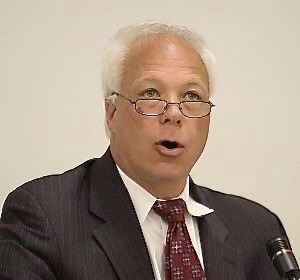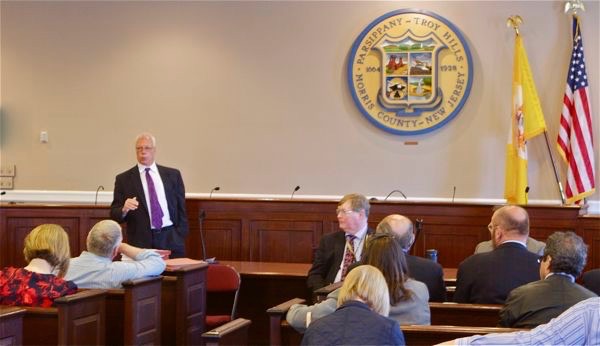Longtime Trenton Insider Unconditionally Featured By NJ Spotlight
Business Group Brags About Revolving Door
[Update below – “Lies are good for business”]
Two days in a row now, NJ Spotlight has quoted Ray Cantor, who was recently installed as a Vice President at the NJ Business and Industry Association (NJBIA).
No doubt, those quotes shaped the NJ Spotlight coverage, while displacing other critical voices from the story.
(In fact, NJ Spotlight seems to have done a complete U-Turn in how they reported the public access story, i.e. see this prior coverage. Did Cantor spin that – like he spun the Christie DEP rules? Or was the favorable coverage today a result of Tim Dillingham’s cowardly and corrupt fold? –
Update: A Trenton reader wrote me to say the amendments were drafted by Cantor and conveyed to DEP and on to legislators from the DEP. Sounds plausible, but I have no evidence to back that up.)
The first was regarding stormwater legislation and the second was about legislation regarding public access to NJ waterfronts.
Both quotes provided no context for readers to learn about who Mr. Cantor is, what he has worked on, and who he has represented.
Curiously, both quotes by NJ Spotlight failed to mention Mr. Cantor’s very recent and very controversial roles in both issues he was given quotes on.
Even NJ ethics rules restrict post employment work – I think there is a one year period during which high level state officials are prohibited from lobbying on issues they worked on while in State government. That post employment restriction is worthy of mention in Cantor’s case. Is he in compliance?
Because we believe readers need context and good information to judge the credibility of news sources and should understand how Trenton operates, we thought we might provide some of that important context.
Ironically, Cantor’s recent installation at NJBIA was announced by a fellow revolving door boss, Michele Siekerka, formerly a politically appointee and Assistant Commissioner in the Christie DEP.
Either NJBIA is tone deaf about the “optics” and ethics of revolving door abuses, or they are bragging with impunity about undue influence peddled by their Trenton insiders.
But at least NJBIA – in contrast to NJ Spotlight – honestly disclosed Cantor’s background:
Cantor, a former assistant commissioner and, later, chief adviser to the commissioner of the Department of Environmental Protection, will lead NJBIA’s advocacy efforts on environmental and energy matters affecting the business community, effective Feb. 11, Siekerka said.
I first met Mr. Cantor in the 1990’s, when he served as staff to the Senate Environment Committee, Chaired by Hank McNamara.
While I rarely agree with him, I like him personally and he is smart, hard working and competent.
But, Ray is essentially a hack: he aggressively and often effectively represents his boss’ interests, often regardless of the science, the public interest and the facts.
More recently, Cantor was involved in highly controversial disputes, yet somehow managed to dodge any personal accountability for a series of high profile train wrecks, such as:
1. The US EPA took a highly unusual step and wrote a letter to call out Cantor’s false testimony to the legislature.
2. Cantor was involved in Christie’s Bridge-gate and was interviewed by Mastro. He personally was involved in promoting development in Hoboken and using his DEP position to accommodate the regulatory needs of the Rockefeller Group. For a link to Cantor’s Mastro interview summary and other details, see this post.
3. Cantor was the DEP point person on the highly controversial Christie DEP rollback of public access rules – this role is directly relevant to contextualize his NJ Spotlight quote today. I wrote
Cantor opened the hearing, repeating DEP’s continuing pattern of half truths and misleading spin. He claimed that the Department’s intent is exclusively to expand and “maximize” public access and respond to the Avalon Court decision.
Sounding like an Israeli right winger defending illegal settlements as “facts on the ground” in Palestine, Cantor claimed that current public access restrictions are a function of geography and history, and that DEP is powerless to change that.
Cantor claimed that no current access will be lost, but did not say how that claim is supported by the proposed new rules or how it would be enforced. Cantor claimed that in the proposed “Municipal Access Plan” approach, that DEP was not delegating any powers to local government because DEP could reject local plans. He then went on to respond to critics, basically claiming that they were misinformed.
4. Cantor was the DEP point person on the highly controversial Christie DEP rollback of the Highlands septic density standards, as I wrote: (that’s Cantor presenting and spinning the rollback)
5. Cantor was the DEP point person for the highly controversial Christie DEP rollback of the stream encroachment and Category One stream buffer rules – this role is directly relevant to contextualize his NJ Spotlight quote yesterday. I wrote:
By repealing the SWRPA, the DEP is eliminating the only linkage between stream encroachment permit requirements and Surface Water Quality Standards.
Today, DEP gave conflicting responses to this criticism. Ray Cantor and Ms. Kopkash claimed it was resolved in the adoption document, but contradicted themselves by later by saying it was resolved in the Concurrent proposal.
Both claims are false.
In all these debates, Cantor was less than honest and constantly spun, misled and manipulated the public, the media and legislators about the true objectives and impacts of the relevant Christie DEP regulatory rollback initiatives.
So, I was not surprised to learn of Cantor’s career move to the NJBIA – he’s been representing business interests in the Republican party, the legislature, the DEP and the media for a long time.
But what I am surprised and disappointed by is the bold impunity with which NJBIA essentially openly brags about revolving door abuses of the public interest.
Just as bad – no, worse – is Tom Johnson’s embrace of a longtime Trenton insider, and giving him a platform to continue to mislead readers and the public about issues essential to the public interest.
That’s beyond lazy journalism – it is just more evidence of the corruption endemic in Trenton circles.
[Update – the Cantor story reminds me of a prior exchange with Dennis Toft, where I concluded “Lies are good for business” (just ask Boeing about that – snark)
Lies are good for business
The lead witness for the business community (Chamber of Commerce, NJ BIA, NAIOP) at yesterday’s Senate Environment Committee hearing on a Resolution (SCR 66) to veto the Christie DEP’s proposed flood hazard rules was lawyer Dennis Toft – previously with the disgraced law firm Wolff & Samson – a man I have described as a “heavy hitter”.
During his introduction, Chairman Smith praised Toft as “the best environmental attorney in the state”.
Take a look at all the damage Toft has done to protections of public health and the environment during the Christie regime:
- Wolff & Samson Lobbying of DEP Is Directly Related to The Port Authority Harrison PATH Project Redevelopment
- Wolff & Samson Helped “Transform” DEP Enforcement Policy
- Wolff & Samson Has Multiple Inside Tracks with the Christie Administration
- Christie Cronies Doing Well, Law and Ethics Be Damned
Toft testified that the C1 steam buffer regulations (SWRPA) the Christie DEP rolled back were a major barrier to redevelopment. Toft testified:
“… within 150 feet you could do nothing. … There has been no process to redevelop those sites. Developers are stymied because they can’t go within 150 feet. The rules eliminated the hardship exemptions.”
Smith challenged Toft’s claim regarding the lack of a process to be granted a hardship waiver.
DEP agreed with Smith, but was unable to answer Smith’s question about how many hardship waivers were granted.
Later in the hearing, during my testimony, I noted that Toft’s claim that C1 buffer rules served as a barrier to redevelopment was false, because the rules do not apply to previously disturbed land. Redevelopment within the existing disturbed footprint is not restricted by the C1 buffer rules (and there are not many C1 waters in urban areas anyway).
I also noted that Toft’s claim “within 150 feet you could do nothing” directly contradicted DEP Ray Cantor’s testimony that so many waivers were issued that DEP had to make it easier to get them.
After the hearing, in the hall outside the hearing room, I ran into Mr. Toft, who told me that I should continue to mention his name on my blog, because it was good for his business.



Pingback: WolfeNotes.com » Gov. Murphy Revokes Christie Executive Order On Regulatory Policy
Pingback: WolfeNotes.com » The Exxon PlayBook Has Been Deployed In NJ For Decades
Pingback: WolfeNotes.com » Murphy DEP Attempt To Close Huge Loophole In Environmental Justice Law Is Doomed To Failure